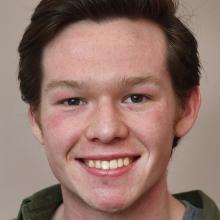
They might be under-represented at the polls, but our youngest voters’ non-enrolment shouldn’t be seen as political apathy, writes Shane Gilchrist.
Will Dreyer is fizzing. At the age of 19, he has the right to vote in a general election for the first time.
He’s popped into the Otago Daily Times office adorned in a green jacket complete with a Green Party badge. It’s not quite heart on sleeve, but close enough to clarify which two boxes he ticked when he cast an early vote this week.
The Otago Campus Greens secretary is enrolled in the Dunedin North electorate, which stands out because of a massive discrepancy in enrolment figures.
According to the Electoral Commission, just over 55% of eligible Dunedin North voters aged between 18 and 24 had enrolled by Wednesday. That’s an almost 30% difference compared to the next lowest cohort, 25-29 years, which is sitting at more than 80%. All other age-groups in Dunedin North are well above 90%. And, as a comparison, Dunedin South’s 18-24 demographic is close to 80%.
Nationally, of an estimated eligible population of 3.57 million, 3.18 million (89%) had enrolled by September 5. Yet only 66.5% of the almost 470,000 of 18 to 24-year-olds eligible to vote had enrolled.
Earlier this year research by Massey University made it clear the issue of young people not voting was not a one-off problem.
"In 2014 only 75% of eligible voters aged 18 to 24 enrolled, and one third of those who did enrol did not vote at all. Roughly the same figures applied for those between the ages of 25 to 29," a Massey academic wrote.
"The turnout at the last election among those aged 18 to 29 was less than 50%. In short, an entire generation is at risk of being lost to politics ..."
This point is not lost on Dreyer who, despite being excited in the build-up to next Saturday’s election, describes the lacklustre enrolment of his peers as "ridiculous".

"Me and my flatmates were discussing ways to increase voter turnout at uni. So that’s why Campus Greens organised a gig [held earlier this week].
"I think a lot of people don’t think they know enough to discuss politics or vote. We also have a culture where we don’t want to offend others by expressing our political views. However, you learn by discussing things. And not talking about politics perpetuates the cycle."
The low enrolment numbers might hint at political disinterest among 18 to 24-year-olds, but that would be a simplistic conclusion.
Forget the notion of apathy and instead focus on disillusionment, discontent and distrust. More specifically, look at the forces that drive such states of mind.
In a 2016 survey by Victoria University, 20% of non-voters answered "not interested" when asked their reason for not going to the polls. That means four out of five non-voters have some other reason, many of which are complex.
Laura O’Connell-Rapira, co-founder of RockEnrol, an organisation dedicated to building and activating political power for young people, says it’s important to note there is no such thing as the "youth vote", that the almost 500,000 18 to 24-year-old eligible voters come from all sorts of backgrounds.
"The ones least likely to vote are of Maori, Pasifika or Asian descent. Recent migrants are less likely to vote than long-term migrants, and those with a low level of income or education are also less likely to turn out at election time. The same goes for young people who live in rural communities.
"In short, if you are part of a group that is marginalised economically and socially, you’re much more likely to be marginalised politically, too.

"What we know from research is that young people don’t vote because parties don’t make an appeal; and parties don’t make an appeal because young people don’t vote," O’Connell-Rapira says.
"Many people think the onus for fixing this cycle of mutual neglect should fall on young people, but we disagree. We think political parties and candidates need to question themselves and ask what they can do better to fix this problem so that young people feel inspired enough to participate.
"Young people are not a homogenous group of political actors. We are the most diverse generation in New Zealand’s history."
Herein lies the irony: if such disengagement is partly based on the feeling that party policies don’t represent the concerns of younger (potential) voters, how can change be effected if a significant number of that cohort doesn’t turn out at the polls?
Prof Janine Hayward, head of University of Otago’s department of politics, describes it as a vicious circle.
"Political parties tend to spend time developing policies for voters, thus they aren’t going to expend much effort on policies for people who aren’t going to turn up to the polls.

"However, some of the issues are changing that. Key issues include climate change, affordability of housing, employment and the cost of education. These have all hit that young generation at the same time. And these young people have parents who are witnessing the consequences of all this.
"I think we can see that in some of the debates, both in terms of the changes of language and perspectives that parties are bringing. They know that if that youth vote really gets some traction it could have a significant effect.
"Some parties are doing a lot more work to engage with the youth vote, both in the last election and the forthcoming one. The Green Party and the Maori Party started doing that in ways that were benefiting them in the polls and other parties, in pragmatic fashion, have seen the need to do similar.
"They are looking to tap into what could potentially be a significant voting block; if it gets engaged."
Prof Hayward emphasises young people are not all going to vote the same way either.
"Campus is not a particularly representive demographic of young people. It’s no surprise that students tend to be more left of centre but, in my classes, they tend to be about a third National, a third Labour and a third Greens."
Enter George Sabonadiere. At 16, he’s too young to vote. Yet he’s politically active, a member of a generation seeking change in a range of ways.

A member of the Dunedin Youth Council and the affiliated Dunedin City Council’s Youth Action Committee, Sabonadiere is also involved in The Peace Foundation and Enviroschools.
A pupil at Logan Park High School, he regards school life as an opportunity.
"I’m privileged in that I have about 60 hours free time a week, because I’m in school. In reality, it’s from 9am until 3pm. There’s plenty of free time. Once you realise that, you get going and can do heaps of stuff. You feel like the sky is the limit."
This points to an unspoken mantra: of action equalling hope, as opposed to cynical disengagement, or what he calls a "really poisonous mindset".
"We often buy into sensationalist ideas of generational differences — that young people are lazy, that old people are grumpy — so I work in youth organisations that often facilitate healthy discussions between young and old."
Sabonadiere, who spoke at a TEDx event in Dunedin last weekend ["I focused on the potential of different generations working together ..."], is no stranger to conversations with older audiences.

"I have spoken to Lions and Rotary clubs and others and I’ve always said that it doesn’t matter if you’re under 30 or over 65, both these generations have a shared preference for action, rather than leaving it to bureaucracy.
"I don’t have much of a stance on whether central government should play a bigger or smaller role, but I do believe in the power of local government to get things done."
That notion of accessibility is a powerful tool, Sabonadiere believes, adding he can organise to meet a local government official or make a submission on an issue and expect a response.
And change can be implemented on a lower level, too, he says.
"For example, I’m working with a group that is currently trying to get solar panels into Dunedin schools. We are one of the only major centres in New Zealand still with schools burning fossil fuels.
"I believe in the power of private enterprise but, in particular, volunteer organisations to get things done in a more effective, more efficient way than local government."

Max Harris, author of The New Zealand Project, has done more than his fair share of thinking on the subject of political engagement.
The New Zealand academic’s book, published earlier this year, is the result of the past three years spent studying at Oxford and explores a range of ideas, from foreign policy and the economy, to criminal justice, race relations, the environment and constitutional change.
Speaking on the phone from England earlier this week, he says there is a lot about politics that needs to change.
"I think most young people are disatisfied rather than disengaged. We need to flip the conversation and not blame young people for not being involved and start asking what it is about the political system that’s not drawing them in.
"I can’t speak for everyone, but I know a lot of young people are concerned about climate change, health and mental health, homelessness and housing issues."
Still, it’s important not to tell a single story about all young people, he says.
"For example, a PhD student such as myself who has had funding for study comes from a different position than, say, a Maori person whose family has historically been disengaged from politics.

"And for young Pasifika people, their parents might have experienced the dawn raids of the 1970s and ’80s and still received no government apology. And a young person on a low income might feel like they have no stake in the system.
"I do think voting is important because it is in Parliament where legislation is made that affects all of us but, to me, politics is much more than what happens in Parliament."
Author and academic Dame Anne Salmond touched on this in a commentary on the website Newsroom, in which she wrote of "a seismic shift" under way in New Zealand.
"Despite all the hype, this election is not really a contest between left and right. Instead, the tectonic plates between the generations are shifting.
"Since the 1980s, New Zealanders have been gripped by neo-liberal doctrines ... In this kind of philosophy, ideas of the ‘fair go’ and caring for others and the land we live in are replaced by an idea of society as a market, and the land as a ‘resource’ to be exploited for short-term profit," Dame Anne stated.
"After more than 30 years of this kind of hyper-individualism, however, a young, smart generation is stepping up who think very differently ... They focus on the long-term future, and the quality of our relations with each other and the planet — Gen Zero on climate change, for instance ..."
Another leading political commentator, veteran journalist Colin James, dealt with this notion of political action outside the state in his recently published book, Unquiet Time: Aotearoa/New Zealand in a fast-changing world.
"Increasingly, cities are centres of power as the global population continues to urbanise. Many cities are getting to the point where, although they exist within a sovereign state, they are also distinct from it."
They can wield a "soft power", exercising influence and eventually winning compliance through example and persuasion.
James points to climate change action as one example, citing the Marrakech summit in November last year when 7100 cities agreed to cut global emissions and monitor each other’s actions.
Prof Hayward agrees: "I think we tend to think of democracy in the light of general elections, but grassroots politics has always been there. And I think our changing circumstances are showing the value of that even more.
"We need to use democracy in a much broader frame. Democracy is about people engaging in issues.
"And that can involve bypassing formal institutions entirely. It can be communities of people finding solutions together."
Dunedin North
The Dunedin North electorate’s relatively low enrolment among 18 to 24-year-olds (currently just over 55% of those eligible) has some dynamics that are difficult to qualify, according to Anastasia Turnbull, the Electoral Commission’s communications and education manager.
"Anecdotally, we hear that young people move often and sometimes find it challenging to remember to keep their enrolment details up to date.
"We also hear that many do live in one city for study but are enrolled back in their hometown. That information isn’t captured on the enrolment form, however, so we are unable to provide statistics around it.
"While we don’t have any specific research targeting reasons for non-enrolment amongst young people, we do know that for young non-voters the biggest barrier is not knowing who to vote for.
"We’re helping to address that barrier in 2017 by supporting tools like On The Fence, Vote Compass and Policy.
"We’re up to 55.1% in Dunedin North’s 18-24 year olds. That’s almost a 2% increase since last week," Turnbull says.
Dee Vickers, the Dunedin Registrar of Electors, says that rise is due "in no small part" to the efforts of campus fieldworkers.
"We are certainly noticing a higher level of interest from the students this year which, hopefully, will transpose into a healthy level of votes cast. The queues of young people waiting to cast advance votes this week in The Link is very encouraging."












